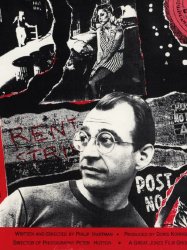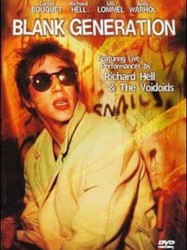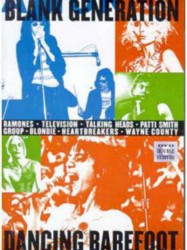Richard Hell est un Acteur et Scénariste Américain né le 2 octobre 1949 à Lexington (Etats-Unis)

Richard Hell (born Richard Lester Meyers) is an American singer, songwriter, bass guitarist, and writer.
Richard Hell was an innovator of punk music and fashion. He was one of the first to spike his hair and wear torn, cut and drawn-on shirts, often held together with safety pins. Malcolm McLaren, manager of the Sex Pistols, has credited Hell as a source of inspiration for the Sex Pistols' look and attitude, as well as the safety-pin and graphics accessorized clothing that McLaren sold in his London shop, Sex.
Hell was in several important, early punk bands, including Neon Boys, Television, and The Heartbreakers, after which he formed Richard Hell & The Voidoids. Their 1977 album Blank Generation influenced many other punk bands. Its title song was named "One of the 500 Songs That Shaped Rock" by music writers in the Rock and Roll Hall of Fame listing and is ranked as one of the all-time Top 10 punk songs by a 2006 poll of original British punk figures, as reported in the Rough Guide to Punk.
Since the late 1980s, Hell has devoted himself primarily to writing, publishing two novels and several other books. He was the film critic for BlackBook magazine from 2004 to 2006.
Richard Hell grew up in Lexington, Kentucky, in the 1950s. His father, a secular Jew, was an experimental psychologist, researching animal behavior. He died when Hell was 7 years old. Hell was then raised by his mother, who came from Methodists of Welsh and English ancestry. After her husband's death, she returned to school and eventually became a professor.
Hell attended the Sanford School in Delaware for one year, where he became friends with Tom Miller, who later changed his name to Tom Verlaine. They ran away from school together and were arrested in Alabama for arson and vandalism a short time later.
Hell never finished high school, instead moving to New York City to make his way as a poet. In New York he met fellow young poet David Giannini, and moved to Santa Fe, New Mexico for several months, where Giannini and Meyers co-founded "Genesis:Grasp". They used an AM VariTyper with changeable fonts to publish the magazine. They began publishing books and magazines, but decided to go their separate ways in 1971, after which Hell created and published Dot Books. Before he was 21, his own poems were published in numerous periodicals, ranging from Rolling Stone to the New Directions Annuals. In 1971, along with Verlaine, Hell also published under the pseudonym Theresa Stern, a fictional poet whose photo was actually a combination of both his and Verlaine's faces in drag, superimposed over one another to create a new identity.
The Neon Boys, Television, and the Heartbreakers
In 1972, Verlaine joined Hell in New York and formed the Neon Boys. In 1974, the band added a second guitarist, Richard Lloyd, and changed their name to Television.
Television's performances at CBGB helped kick-start the first wave of punk bands, inspiring a number of different artists including Patti Smith, who wrote the first press review of Television for the Soho Weekly News in June 1974. She formed a highly successful band of her own, The Patti Smith Group. Television was one of the early bands to play at CBGB because their manager, Terry Ork, persuaded owner Hilly Kristal to book them to alongside the Ramones. They also built the club's first stage.
Hell started playing his punk rock anthem "Blank Generation" during his time in Television. In early 1975, Hell parted ways with Television after a dispute over creative control. Hell claimed that he and Verlaine had originally divided the songwriting evenly but that later Verlaine sometimes refused to play Hell's songs. Verlaine remained silent on the subject.
Hell left Television the same week that Jerry Nolan and Johnny Thunders quit the New York Dolls. In May 1975, the three of them formed The Heartbreakers; not to be confused with Tom Petty's band, which adopted the same name the following year. After one show, Walter Lure joined The Heartbreakers as a second guitarist.
Richard Hell and the Voidoids
In December 1975, Hell quit The Heartbreakers and started Richard Hell and the Voidoids with Robert Quine, Ivan Julian and Marc Bell. The band released two albums, though the second, Destiny Street, retained only Quine from the original group, with Naux (Juan Maciel) on guitar and Fred Maher on drums, and suffered from Hell's distractions, narcotics especially, during recording. Hell's best known songs with the Voidoids included "Blank Generation", "Love Comes in Spurts", "The Kid With the Replaceable Head" and "Time". In 2009, the guitar tracks on Destiny Street were re-recorded and released as Destiny Street Repaired, with guitarists Julian, Marc Ribot and Bill Frisell playing with the original rhythm tracks.
Also in 2009, Hell gave his blessing to the public access program Pancake Mountain to create an animated music video for "The Kid with the Replaceable Head". It was the Voidoids first and only official music video. The cut used for the animation appears on Hell's 2005 retrospective album, Spurts, The Richard Hell Story.
Dim Stars and Hell's books, further life
Hell's only other album release was as part of the band Dim Stars, for which he came out of retirement for a month in the early 1990s. Dim Stars featured guitarist Thurston Moore and drummer Steve Shelley from Sonic Youth, Gumball's guitarist Don Fleming, and Quine. They formed only to record the one album and one EP, both titled Dim Stars, and played one show in public, a WFMU benefit at the The Ritz in Manhattan. Hell played bass, sang lead vocals and wrote the lyrics for the album.
Hell also co-wrote and sang lead vocals on the song "Never Mind" by The Heads, a 1996 collaborative effort between three former members of Talking Heads.
In 1996, Hell wrote a novel, Go Now, drawn largely from his own experiences. He released a collection of short pieces (poems, essays and drawings) called Hot and Cold in 2001. His second novel, Godlike, was published in 2005 by Akashic Books as part of Dennis Cooper's Little House on the Bowery Series. All three books were highly praised. Also published in 2005 was Rabbit Duck, a book of 13 poems written in collaboration with David Shapiro. Hell's nonfiction has been widely anthologized as well, including a number of appearances in "best music writing" collections.
Hell's archive of his manuscripts, tapes, correspondence (written and email), journals, and other documents of his life was purchased for $50,000 by New York University's Fales Library in 2003.
Hell has appeared in several low-budget films, most notably Susan Seidelman's Smithereens. (Other acting appearances include Uli Lommell's Blank Generation, Nick Zedd's Geek Maggot Bingo, Rachel Amadeo's What About Me? and Rachid Kerdouche's Final Reward. Hell had a non-speaking cameo role as Madonna's murdered boyfriend in Susan Seidelman's 1985 Desperately Seeking Susan.)
Hell was married to Scandal's Patty Smyth for two years during 1985–86, and they had a daughter, Ruby. Hell married Sheelagh Bevan in 2002.
Source : Wikidata
Richard Hell

Nom de naissance Richard Lester Meyers
Nationalité Etats-Unis
Naissance 2 octobre 1949 (75 ans) à Lexington (Etats-Unis)
Nationalité Etats-Unis
Naissance 2 octobre 1949 (75 ans) à Lexington (Etats-Unis)
Richard Hell was an innovator of punk music and fashion. He was one of the first to spike his hair and wear torn, cut and drawn-on shirts, often held together with safety pins. Malcolm McLaren, manager of the Sex Pistols, has credited Hell as a source of inspiration for the Sex Pistols' look and attitude, as well as the safety-pin and graphics accessorized clothing that McLaren sold in his London shop, Sex.
Hell was in several important, early punk bands, including Neon Boys, Television, and The Heartbreakers, after which he formed Richard Hell & The Voidoids. Their 1977 album Blank Generation influenced many other punk bands. Its title song was named "One of the 500 Songs That Shaped Rock" by music writers in the Rock and Roll Hall of Fame listing and is ranked as one of the all-time Top 10 punk songs by a 2006 poll of original British punk figures, as reported in the Rough Guide to Punk.
Since the late 1980s, Hell has devoted himself primarily to writing, publishing two novels and several other books. He was the film critic for BlackBook magazine from 2004 to 2006.
Biographie
Early life and careerRichard Hell grew up in Lexington, Kentucky, in the 1950s. His father, a secular Jew, was an experimental psychologist, researching animal behavior. He died when Hell was 7 years old. Hell was then raised by his mother, who came from Methodists of Welsh and English ancestry. After her husband's death, she returned to school and eventually became a professor.
Hell attended the Sanford School in Delaware for one year, where he became friends with Tom Miller, who later changed his name to Tom Verlaine. They ran away from school together and were arrested in Alabama for arson and vandalism a short time later.
Hell never finished high school, instead moving to New York City to make his way as a poet. In New York he met fellow young poet David Giannini, and moved to Santa Fe, New Mexico for several months, where Giannini and Meyers co-founded "Genesis:Grasp". They used an AM VariTyper with changeable fonts to publish the magazine. They began publishing books and magazines, but decided to go their separate ways in 1971, after which Hell created and published Dot Books. Before he was 21, his own poems were published in numerous periodicals, ranging from Rolling Stone to the New Directions Annuals. In 1971, along with Verlaine, Hell also published under the pseudonym Theresa Stern, a fictional poet whose photo was actually a combination of both his and Verlaine's faces in drag, superimposed over one another to create a new identity.
The Neon Boys, Television, and the Heartbreakers
In 1972, Verlaine joined Hell in New York and formed the Neon Boys. In 1974, the band added a second guitarist, Richard Lloyd, and changed their name to Television.
Television's performances at CBGB helped kick-start the first wave of punk bands, inspiring a number of different artists including Patti Smith, who wrote the first press review of Television for the Soho Weekly News in June 1974. She formed a highly successful band of her own, The Patti Smith Group. Television was one of the early bands to play at CBGB because their manager, Terry Ork, persuaded owner Hilly Kristal to book them to alongside the Ramones. They also built the club's first stage.
Hell started playing his punk rock anthem "Blank Generation" during his time in Television. In early 1975, Hell parted ways with Television after a dispute over creative control. Hell claimed that he and Verlaine had originally divided the songwriting evenly but that later Verlaine sometimes refused to play Hell's songs. Verlaine remained silent on the subject.
Hell left Television the same week that Jerry Nolan and Johnny Thunders quit the New York Dolls. In May 1975, the three of them formed The Heartbreakers; not to be confused with Tom Petty's band, which adopted the same name the following year. After one show, Walter Lure joined The Heartbreakers as a second guitarist.
Richard Hell and the Voidoids
In December 1975, Hell quit The Heartbreakers and started Richard Hell and the Voidoids with Robert Quine, Ivan Julian and Marc Bell. The band released two albums, though the second, Destiny Street, retained only Quine from the original group, with Naux (Juan Maciel) on guitar and Fred Maher on drums, and suffered from Hell's distractions, narcotics especially, during recording. Hell's best known songs with the Voidoids included "Blank Generation", "Love Comes in Spurts", "The Kid With the Replaceable Head" and "Time". In 2009, the guitar tracks on Destiny Street were re-recorded and released as Destiny Street Repaired, with guitarists Julian, Marc Ribot and Bill Frisell playing with the original rhythm tracks.
Also in 2009, Hell gave his blessing to the public access program Pancake Mountain to create an animated music video for "The Kid with the Replaceable Head". It was the Voidoids first and only official music video. The cut used for the animation appears on Hell's 2005 retrospective album, Spurts, The Richard Hell Story.
Dim Stars and Hell's books, further life
Hell's only other album release was as part of the band Dim Stars, for which he came out of retirement for a month in the early 1990s. Dim Stars featured guitarist Thurston Moore and drummer Steve Shelley from Sonic Youth, Gumball's guitarist Don Fleming, and Quine. They formed only to record the one album and one EP, both titled Dim Stars, and played one show in public, a WFMU benefit at the The Ritz in Manhattan. Hell played bass, sang lead vocals and wrote the lyrics for the album.
Hell also co-wrote and sang lead vocals on the song "Never Mind" by The Heads, a 1996 collaborative effort between three former members of Talking Heads.
In 1996, Hell wrote a novel, Go Now, drawn largely from his own experiences. He released a collection of short pieces (poems, essays and drawings) called Hot and Cold in 2001. His second novel, Godlike, was published in 2005 by Akashic Books as part of Dennis Cooper's Little House on the Bowery Series. All three books were highly praised. Also published in 2005 was Rabbit Duck, a book of 13 poems written in collaboration with David Shapiro. Hell's nonfiction has been widely anthologized as well, including a number of appearances in "best music writing" collections.
Hell's archive of his manuscripts, tapes, correspondence (written and email), journals, and other documents of his life was purchased for $50,000 by New York University's Fales Library in 2003.
Hell has appeared in several low-budget films, most notably Susan Seidelman's Smithereens. (Other acting appearances include Uli Lommell's Blank Generation, Nick Zedd's Geek Maggot Bingo, Rachel Amadeo's What About Me? and Rachid Kerdouche's Final Reward. Hell had a non-speaking cameo role as Madonna's murdered boyfriend in Susan Seidelman's 1985 Desperately Seeking Susan.)
Hell was married to Scandal's Patty Smyth for two years during 1985–86, and they had a daughter, Ruby. Hell married Sheelagh Bevan in 2002.
Le plus souvent avec
Filmographie de Richard Hell (7 films)
Acteur
 , 1h31
, 1h31Genres Documentaire
Thèmes La musique, Documentaire sur la musique, Documentaire sur une personnalité, Musique
Acteurs Henry Rollins, Jello Biafra, Richard Hell, Michael Peter Balzary, J Mascis
Note76%






No Picnic (1986)
, 1h24Origine Etats-Unis
Genres Drame
Acteurs David Brisbin, Judith Malina, Ryan Cutrona, Luis Guzmán, Richard Hell, Steve Buscemi
Rôle Irate Tenant
Note66%





Failed musician Macabee Cohen (David Brisbin), makes his living servicing jukeboxes in the neighborhood, while in the search for the woman of his dreams. The obvious gentrification around is distressing and highlights his ill-fated life. His frustration increases when faced with individuals who remind him of his former aspirations.
 , 1h44
, 1h44Réalisé par Susan Seidelman
Origine Etats-Unis
Genres Drame, Comédie, Comédie dramatique, Comédie policière, Comédie romantique, Action, Policier, Romance
Thèmes Maladie, Sexualité, Folie, Le handicap
Acteurs Rosanna Arquette, Aidan Quinn, Madonna, Robert Joy, Mark Blum, Laurie Metcalf
Rôle Bruce Meeker
Note60%





Roberta, jeune bourgeoise un peu coincée du New Jersey, s'ennuie ferme dans sa luxueuse maison. Et quand elle découvre dans les petites annonces « Recherche Susan désespérément », elle décide d'enquêter pour savoir qui est cette fameuse Susan…
 , 1h14
, 1h14Origine Etats-Unis
Genres Comédie, Comédie horrifique, Fantasy, Horreur
Thèmes Comédie horrifique
Acteurs Richard Hell
Note35%






La Dérive (1982)
, 1h29Réalisé par Susan Seidelman
Origine Etats-Unis
Genres Drame, Musical, Romance
Acteurs Richard Hell, Amos Poe, Cookie Mueller, Chris Noth, Roma Maffia, John Doe
Rôle Eric
Note66%





Smithereens is the story of Wren (Susan Berman), an independent spirit from New Jersey trying to self-promote herself into the New York punk scene. She meets Paul (Brad Rijn), who ran away from Montana and lives out of his van in a parking lot. Paul seems to offer genuine friendship, however, Wren is only interested in forming meaningless relationships in hopes of bolstering her nonexistent career. She has no musical talents or industry skills, yet she aggressively pursues a pathetic spot for herself in places like the Peppermint Lounge. She drops Paul for Eric (Richard Hell, who also performs on the musical score), who has a record deal, and they work out a plan to escape to California, which requires Wren to pose as a prostitute in order to scam money from a prospective john. Things don't work out, and Wren finds herself hitting one wall after another, eventually getting kicked out of her apartment. With no place to go, Wren seeks out everyone she knows in the city, only to find herself left alone.

Blank Generation (1980)
, 1h30Réalisé par Ulli Lommel
Origine Etats-Unis
Genres Drame, Musical, Romance
Thèmes La musique, Musique
Acteurs Carole Bouquet, Richard Hell, Ulli Lommel, Suzanna Love, Andy Warhol
Rôle Billy
Note48%






The Blank Generation (1976)
, 53minutesRéalisé par Amos Poe, Ivan Král
Origine Etats-Unis
Genres Documentaire, Musical
Thèmes La musique, Documentaire sur la musique, Documentaire sur une personnalité, Musique
Acteurs Debbie Harry, Richard Hell, Jayne County, Lenny Kaye, David Byrne, Ivan Král
Note62%





Directors and producers Ivan Kral and No Wave filmmaker Amos Poe use actual behind-the-scenes footage of punk musicians before they became icons – Iggy Pop, Blondie, Patti Smith. Also, there is The Ramones, Television, Talking Heads, New York Dolls, The Heartbreakers, The Shirts, Robert Gordon as visitors to New York's CBGB's,
Scénariste

Blank Generation (1980)
, 1h30Réalisé par Ulli Lommel
Origine Etats-Unis
Genres Drame, Musical, Romance
Thèmes La musique, Musique
Acteurs Carole Bouquet, Richard Hell, Ulli Lommel, Suzanna Love, Andy Warhol
Note48%





 Connexion
Connexion




